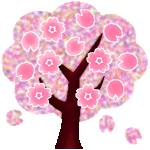January 1
Coming-of-Age Day
Second Monday of January
This national holiday was established to congratulate and encourage people who have reached the age of majority (20) during the year. Cities and towns throughout the nation hold ceremonies for these people.
National Foundation Day
February 11
This national holiday was established as a day to reflect on the establishment of the nation and to nourish a love for the country. Until 1948, it was known as Kigen-setsu, Kigen-setsu, a holiday commemorating the day on which---according to the Nihon-shoki--- Emperor Jimmu is said to have ascended the throne in 660 BC.
Vernal Equinox
Around March 21
 This national holiday was established in 1948 as a day for the admiration
of nature and the love of living things. Until 1948, it was an imperial
ancestor worship festival called Shunki korei-sai .
This national holiday was established in 1948 as a day for the admiration
of nature and the love of living things. Until 1948, it was an imperial
ancestor worship festival called Shunki korei-sai .
Showa Day
April 29
This national holiday was established in 2007 as a day to reflect on the events of the Showa period. As the birthday of the Showa Emperor, April 29 was originally celebrated as a holiday during his lifetime. After the death of the emperor in 1989, the date continued to be a holiday under the new name "Greenery Day". In 2007, Greenery Day was moved to May 4, and April 29 took the name "Showa Day" in honor of the late Emperor. Showa Day marks the start of the Golden Week holiday period.
Constitution Memorial Day
May 3
This national holiday commemorate the day on which Japan's postwar constitution took effect.
Greenery Day
May 4
This national holiday is celebrated as a day to commune with nature and
be grateful for its blessings. Greenery Day falls during Golden Week. (NB:
From 1986 to 2006, May 4 was a holiday known as Kokumin no kyujitsu (lit. national day of rest) in accordance
with Japanese law, which stipulates that any weekday that falls between
two holidays shall also be a holiday.)
holiday known as Kokumin no kyujitsu (lit. national day of rest) in accordance
with Japanese law, which stipulates that any weekday that falls between
two holidays shall also be a holiday.)
Children's Day
May 5
This national holiday was established in 1948, as a day on which to esteem the personalities of children and plan for their happiness. On this day, families who have a boy in their home may fly carp streamers and decorate their homes with armor or samurai dolls. Children's Day marks the end of Golden Week.

Marine Day
Third Monday of July
This national holiday was established as a day of gratitude for the blessings of the oceans and for hoping for the prosperity of Japan as a maritime nation.
Respect-for-the-Aged Day
Third Monday of September
This national holiday was established as a day to respect the elderly and celebrate long life.
Autumnal Equinox
Around September 23
 This national holiday was established as a day on which to honor one's
ancestors and remember the dead. Until 1948, the autumnal equinox was an
imperial ancestor worship festival called Shuki korei-sai.
This national holiday was established as a day on which to honor one's
ancestors and remember the dead. Until 1948, the autumnal equinox was an
imperial ancestor worship festival called Shuki korei-sai.
Health and Sports Day
Second Monday of October

This national holiday was established as a day on which to enjoy sports
and cultivate a healthy mind and body. Originally held on October 10th
to commemorate the anniversary of the opening ceremony of the 1964 Tokyo
Olympics.
Culture Day
November 3
This national holiday commemorates the November 3, 1946 announcement of the Constitution. It is recognized as a day to celebrate peace and freedom and promote culture. (NB: Although prior to the establishment of this holiday in 1948, November 3 was also a national holiday called Meiji-setsu commemorating the birthday of Emperor Meiji, the two holidays are ostensibly unrelated.)
Labor Thanksgiving Day
November 23
This national holiday was established an occasion for praising labors, celebrating production and giving one another thanks. Prior to the establishment of this holiday, November 23rd was celebrated as an imperial harvest festival called Niiname-sai .
The Emperor's Birthday
December 23
The birthday of the reigning emperor has been a national holiday since 1868. It is currently celebrated on December 23; Emperor Akihito was born on this day in 1933. (NB: Prior to the death of Emperor Hirohito in 1989, this holiday was celebrated on April 29. See "Showa Day" above.)